Resilient dreams: Arifa Aminy's journey to UCL
10 August 2023
Many remarkable students have graduated from UCL in recent weeks, and one of them, Arifa Aminy, has a truly extraordinary story to tell. VPEE students journalists Camille and Suzanna interviewed Arifa about her inspiring journey from a war-torn homeland to the halls of UCL.
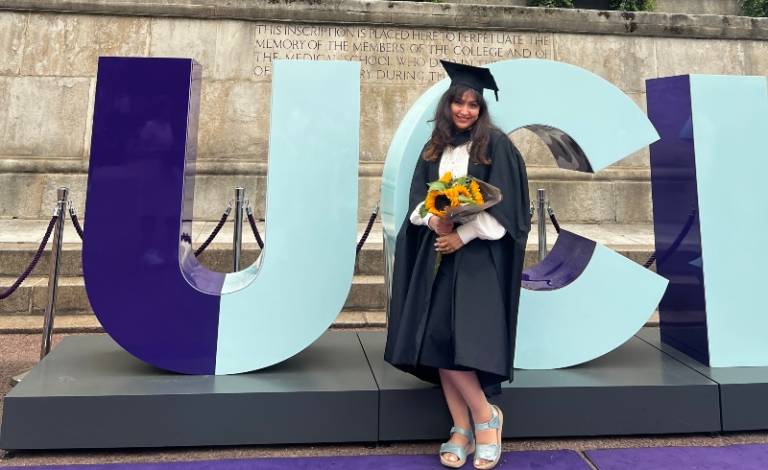
Arifa has set many firsts at UCL, being the first-ever Equity Officer and an Afghan woman student with caring responsibilities in the Students' Union. Her leadership in the SU saw many improvements to the inclusivity of our student community, including the establishment of the first Equality and Diversity Unit and initiatives like child-friendly study spaces for student carers, free period products, support for LGTBQ+ students, and 12 cultural events every year to improve all students' sense of belonging.
But what's perhaps even more inspiring about Arifa is her journey to UCL and pursuit of education. Unfortunately, her home country, Afghanistan, has been a site of conflict and suppression of human rights in recent decades, especially regarding education for women and girls.
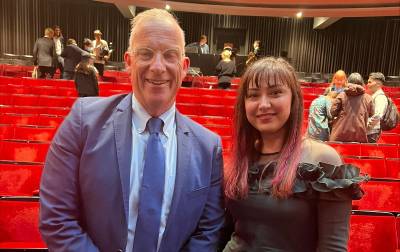
We spoke to Arifa about what it has been like to chase her dreams as a girl growing up in Afghanistan, what education means for her, and what she hopes for the future.
Can you tell us a bit about your journey to the UK and UCL?
My name is Arifa, and I was born in Kabul when the civil war broke out in Afghanistan in the 90s.
When I was about to start school, my area and the schools there were bombed, forcing us to leave Kabul for northern Afghanistan. The chaos and destruction caused by the fighting throughout the country made people desperate for safety, and when I was close to starting high school, the Taliban quickly rose to power with the promise of that safety. But that promise turned out to be an empty one, and they acted with brutality and cruelty unprecedented by any previous group. The Taliban murdered and plundered on a mass level, especially against ethnic minorities like the Hazaras and Uzbeks like me, who once again were forced to run.
I never gave up hope to continue my education through all of this, despite the Taliban then starting to ban women from all organisations – government agencies, hospitals, universities, and public sectors. They also closed down all schools for girls just when I put so much hope and effort into my high school entrance exams. I never heard back about the results of my exam. For months, I was glued to the radio, barely leaving the house, desperate for any news about the Taliban opening up the schools again.
I never gave up hope to continue my education through all of this, despite the Taliban then starting to ban women from all organisations – government agencies, hospitals, universities, and public sectors.“
I still remember fondly the stories my mother would tell when I was asking her when schools would open. She shared her story about how she would have to keep the light in the oil lamp (called Fanoos in Persian) hidden in the small dark room so that her father would not notice her studying for her school exams late at night.
My mother had been raised in a time in Afghanistan when the government was relatively liberal and open-minded. They allowed boys and girls to be educated in mixed schools, something that is unheard of now. Despite this progressive state of the country at the time, families were still imposing the traditional mindset on their girls. My mother was thirsty for education. She had always wanted to become a doctor because she had lost her own mother at a very early age and was left raising her younger siblings without support. She wanted to finish her education, but because of cultural pressure, she was forced to marry my dad at age 18. Her curiosity and habit of constantly reading and looking for new books were contagious and impressed me deeply from a very young age. She also left me with her own dream of becoming a doctor. I remember her encouraging me to read and write and telling me: “Arifa, you should be the one to continue my journey, to be educated and write and continue my story.”
So when news of schools reopening never came, I fought the growing depression about my lack of education by reading and re-reading the books we had available in the house – in the dark, under the Fanoos late at night, just like my mother used to do.
A year passed like this. Reading books at home was a small consolation, but I yearned for more. Some of the stories I happened to read were detective novels where the heroes were taking considerable risks to fight their upcoming challenges. I decided it was time for me to create my own story. I convinced several girls in my neighbourhood to start a sewing class. It went well, and it was so refreshing to finally have a community again, which, however small, provided some support. The group also motivated me to think I could create an environment for education similarly. I convinced them to start an English class and even found a teacher through our network. Every day I used to leave the house in fear and risk my life just to learn English for an hour.
“Every day I used to leave the house in fear and risk my life just to learn English for an hour.
Taking risks moulded me into a fighter. Since then, many things have changed. The first wave of Taliban came and left. I entered university, left it, got married, left Afghanistan, my parents' death, had two children, and decided to continue my education in the UK. I took English courses first, did an undergraduate degree in international development at the University of East London, and finally found myself doing a Master’s degree in public administration at UCL. I did all of this while raising two lovely boys.
So many things have changed in my life since I started taking risks and standing against my fear. At every step of the way, I kept being a fighter, and I keep fighting to this day. The flame of the Fanoos that carried my mother carried me through my childhood. It has kept me alive and will continue to carry me into my future.
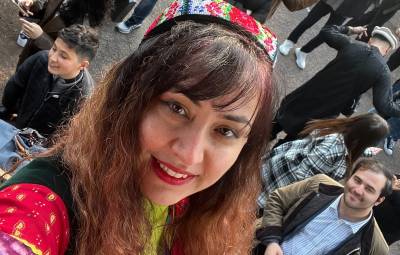
Image, above: Arifa at a Nowroz celebration in UCL's Quad
At every step of the way, I kept being a fighter, and I keep fighting to this day.“
What are some challenges you’ve faced during your studies at UCL as an Afghan student?
Most of the challenges I faced during my studies at UCL were during Covid and lockdowns, when I was going through some personal challenges and had to homeschool my children, study, and work. I am used to challenges, so it didn't affect me enough to make me give up my studies. But it was also difficult to see Afghanistan falling into the Taliban's hands around this period. I kept thinking about the girls and women having to go through the same situation I went through as a child and kept waking up everyday hearing more shocking news coming out of my country. It was a very hard time for me when all those terrifying memories from my childhood flashed back.
I am used to challenges, so it didn't affect me enough to make me give up my studies.“
As an Afghan female student, what does education mean to you? Has studying at London and UCL with students worldwide changed your idea of education?
As an Afghan refugee, education is like food and water. It is something I am always hungry and thirsty for and have to fight relentlessly for. I think without education, you can't survive. Also, it is light that makes you see things more clearly and makes the world a better place.
I think UCL is a great place to study, as you can learn many things outside classroom activities with students worldwide. Education is not only about textbooks. It is about learning from each other and accepting and respecting each other's values, faith, beliefs, and differences.
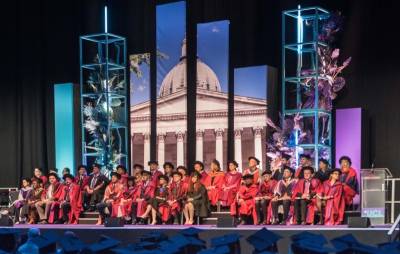
Image, above: Arifa onstage as part of a Platform Party at UCL's 2022 Graduations
As an Afghan refugee, education is like food and water. It is something I am always hungry and thirsty for and have to fight relentlessly for.“
Looking into the future, what are your plans now that you’ve graduated?
My ambition is to give back what I learned and experienced in the UK. I know how hard it is when you do not have access to opportunities because of your gender identity, and I want to mentor as many disadvantaged people as possible to help them reach their potential.
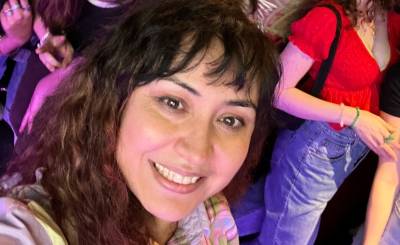
Image, above: Arifa at a celebration for International Women's Day
Is there anything you’d like to say to other Afghan women and girls who’ve come to the UK to pursue education?
Afghanistan is the only country where education is forbidden for women and girls. And every day, Afghan women and girls risk their lives to fight for education. I want to tell them, “You are the world's strongest person, and you're the champion.” Keep going! I believe one day, education will win, and we will win to reach the light.
I believe one day, education will win, and we will win to reach the light.“

About the authors
Camille Koebel is a 2nd year student in the European Social and Political Studies BA programme at UCL. She sees the UCL VPEE Student Journalism Scheme as a great opportunity to hone the skills required for a career in this field. She is looking forward to writing for UCL News to provide students with articles that feel relevant to their experiences, aspirations, and life, giving them a voice and helping them make the most out of UCL!
Suzanna Chen is a second-year undergraduate student in the Arts and Sciences programme. As a Chinese-Canadian student with disabilities, she is passionate about bringing her unique perspective and shining a light on lesser-acknowledged topics as a student journalist – and hopefully as a professional one in the future. As well as being part of the UCL VPEE Student Journalism Scheme, she is also Editor-in-Chief of the London Tab.
Find out more about the UCL Student Journalism Scheme here.
 Close
Close

